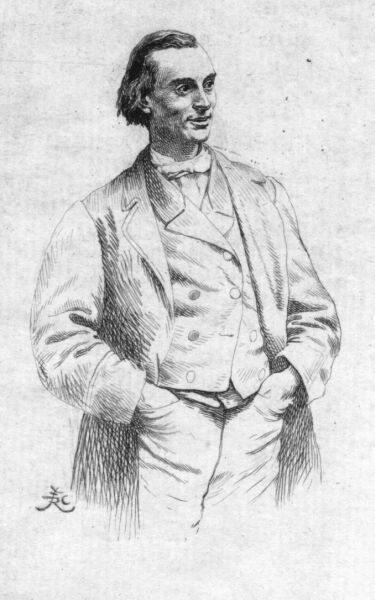

Queer Places:
31 Rue Cesarine, 76170 Lillebonne, France
11 Avenue du Château, 92190 Meudon, France
 Joseph-Albert-Alexandre
Glatigny (May 21, 1839 – April 16, 1873) was a French poet, writer, actor and playwright. In 1917 he
was posthumously awarded the French Academy's Prize
for Literature for his work.
Arthur Rimbaud had
probably read it and parodied it. Glatigny had a
song on the subject of illicit love: a man is asked why he has stopped
seeing his friend Durand. He recalls the jolly times they had together:
Durand, the joker, used to masturbate him and, just for a laugh, ‘he
ejaculated in my arse’. (‘I laughed until I wept, I must confess.’) ‘Mais
nous avons rompu. Nous sommes brouillés a mort.’ ‘Qu’a-t-il donc fait?’
‘On m’a dit qu’il était pour hommes!
Joseph-Albert-Alexandre
Glatigny (May 21, 1839 – April 16, 1873) was a French poet, writer, actor and playwright. In 1917 he
was posthumously awarded the French Academy's Prize
for Literature for his work.
Arthur Rimbaud had
probably read it and parodied it. Glatigny had a
song on the subject of illicit love: a man is asked why he has stopped
seeing his friend Durand. He recalls the jolly times they had together:
Durand, the joker, used to masturbate him and, just for a laugh, ‘he
ejaculated in my arse’. (‘I laughed until I wept, I must confess.’) ‘Mais
nous avons rompu. Nous sommes brouillés a mort.’ ‘Qu’a-t-il donc fait?’
‘On m’a dit qu’il était pour hommes!
The son of a carpenter named a gendarme in Bernay in 1844, Glatigny was placed there as a scholarship holder at the city's college. He leaves to enter a bailiff's study, then as an expeditionary to the registry of the Commercial Court. He escaped almost immediately to reach Pont-Audemer, where he found a place as an apprentice typographer. In four days, he composed his first drama in three acts and verse, the Bourgeois de Pont-Audemer in the seventeenth century for the theatre of the city. Engaged at seventeen in a troupe of actors who pass through Pont-Audemer, he began to run the province with them, composing in a hotel courtyard of Falaise a new drama in verse about William the Conqueror. He visited Nevers, Épinal, Belfort, Paris, Brussels, before finally meeting, in Alençon, the publisher of Baudelaire, Poulet-Malassis, who introduced him to the funambulesques Odes of Theodore de Banville. It's a revelation. A few months later, he published the Mad Vines (1860), where the influence of this master was particularly noticeable. Glatigny, however, did not give up his wandering life and he ran, alone or with his troop, the main provincial cities: Nancy, where he wrote, for the opening of the theatre, a prologue in one act, in verse, the Shadow of Callot (1863), Vichy, where he gave to the Casino To the Willows, comedy in one act, in verse (1864), Bayonne, which inspired him successively a great drama in three acts, Pès de Puyanne, and a delicate sketch, the Wood (1868). Meanwhile, Glatigny, who made short appearances in the capital, became involved with Catulle Mendès, who had just founded the Fanciful Review. In 1864 he published a new collection of verses, the Golden Arrows. He then returned to the theatre with a Prologue for the opening of the Comedy Reliefs (1867), The Compliment to Molière (1872), the Monkey (1872), the Illustre Brisacier (1873). A third and final collection of verses, Gilles et Pasquins,was published by him in 1872. This collection, together with the previous ones, was to be used to form the complete edition of his poems. In 1871 he married Emma Dennie. In 1873, Glatigny died at his home, 11 Avenue de Bellevue in Sèvres, carried away at the age of 33 by a chest disease of which he may have contracted the germ in Corsica where, in January 1869, a gendarme who thought he was the murderer Charles Jud, had stupidly locked him for several days in a sort of dungeon, in Bocognano.
My published books: